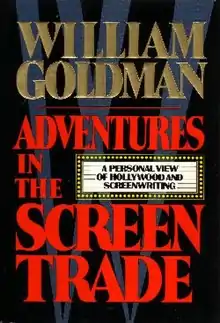Adventures in the Screen Trade
Adventures in the Screen Trade is a book about Hollywood written in 1983 by American novelist and screenwriter William Goldman. The title is a pun on Dylan Thomas's Adventures in the Skin Trade.
 First edition | |
| Author | William Goldman |
|---|---|
| Country | United States |
| Language | English |
| Publisher | Warner Books |
Publication date | 1983 |
Overview
The book is divided into three parts. "Part One: Hollywood Realities" is a collection of essays on various subjects ranging from movie stars and studio executives to his thoughts on how to begin and end a screenplay and how to write for a movie star.
"Part Two: Adventures" has stories from 11 projects that Goldman has been involved with, from Charly and Masquerade, to the Academy Award-winning Butch Cassidy and the Sundance Kid and All the President's Men, to some projects that remained unrealised, such as a musical remake of Grand Hotel.
In "Part Three: Da Vinci", Goldman shows the reader how he would go about adapting his own short story "Da Vinci" into a screenplay. The full text of "Da Vinci" and the subsequent screenplay that he wrote are included, followed by interviews with key movie industry figures, including director George Roy Hill, cinematographer Gordon Willis, and composer Dave Grusin.
There is also an expanded edition of the book, which includes the full screenplay of Butch Cassidy and the Sundance Kid, plus Goldman's analysis of the screenplay's strengths and weaknesses, as "Part Three", and moves the "Da Vinci" section to "Part Four".
Background
In the late 1970s, Goldman did hours of interviews with John Brady for a book that became The Craft of the Screenwriter (1981). Some of Goldman's answers were edited into a magazine piece for Esquire; this was read by an editor at a publishing house who contacted him about writing a book on screenwriting. Goldman agreed and hired Brady to work on the book with him, getting Brady to interview him over several sessions. These conversations were taped and transcribed, which Goldman used as the basis for the book.[1]
Reception
The book became a best seller and has since become recognized as an industry classic.[2] Art Kleiner wrote, "This is one of the three most engrossing 'creative confessional' books I've ever read."[3]
References
- Egan p 177-178
- Egan p 182
- Kleiner, Art (Summer 1987). "Adventures in the Screen Trade". Whole Earth Review. San Francisco: Point Foundation: 120.
- Goldman, William (1989). Adventures in the Screen Trade: A Personal View of Hollywood and Screenwriting (reissue ed.). Grand Central Publishing. ISBN 0-446-39117-4.
- Goldman, William (1996). Adventures in the Screen Trade: A Personal View of Hollywood (2nd rev. ed.). Abacus. ISBN 0-349-10705-X.
- Egan, Sean, William Goldman: The Reluctant Storyteller, Bear Manor Media 2014